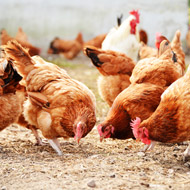H7N9 mutation could reduce vaccine effectiveness - study

H7N9 viruses are currently circulating in poultry populations in China and have so far caused more than 1,600 human cases.
Pirbright scientists have identified a mutation in the H7N9 avian influenza virus that could allow it to escape immune system defences, reducing the effectiveness of vaccines.
H7N9 viruses are currently circulating in poultry populations in China and have so far caused more than 1,600 human cases - over 600 of which have been fatal.
Research published in the Journal of Virology shows that small genetic differences in the virus surface proteins can stop antibodies that protect against a low pathogenic form of the virus from binding to a more virulent form.
This protein, called haemagglutinin, enables the first stage of infection, where the virus attaches to cells and initiates entry into them. Antibodies that bind to the haemagglutinin prevent this process, thereby protecting against infection.
Professor Munir Iqbal, head of the avian influenza group at Pirbright, said: “We discovered that a single amino acid substitution on the H7N9 haemagglutinin, changes its structure enough to reduce antibody binding levels between the two pathotypes.
“This suggests that a single vaccine might not be able to protect against both low and high pathogenicity H7N9 viruses if they carry different amino acid residues at the identified site, stressing the importance of continually monitoring outbreak strains for genetic changes in this region.”
The research team also found that antibodies produced against the high pathogenicity virus showed strong cross-reactivity to both the high and low pathogenicity viruses, compared to those produced against the low pathogenicity virus.
Scientists said this suggests vaccines developed from high pathogenicity strains may be better vaccine candidates for protecting poultry and humans in China. Further research is needed to understand the effect of genetic variations at the site researchers identified in the haemagglutinin.



 The latest
The latest